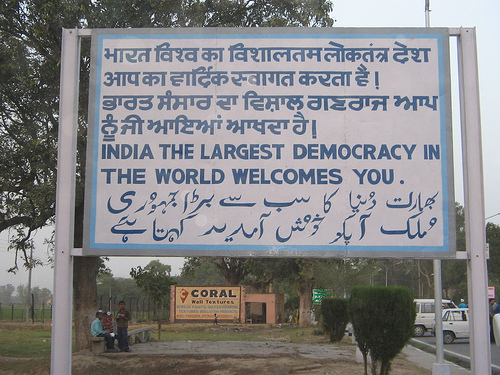When the brain drain is healthy for democracy
 The endurance of Indian democracy is one of the great Indian puzzles. How has a population so large, so ethnically and linguistically fragmented, and so economically unequal managed to sustain a participatory democracy since 1947? What forces have kept the country politically stable, enabling the rapid economic growth of the past two decades?
One intriguing answer comes from political scientist Devesh Kapur, who studies the political effects of skilled migration (the so-called brain drain) on migrants’ home countries (we’ve blogged before about the positive economic effects of the brain drain). In a new book presented yesterday at the Center for Global Development, Kapur finds:
The endurance of Indian democracy is one of the great Indian puzzles. How has a population so large, so ethnically and linguistically fragmented, and so economically unequal managed to sustain a participatory democracy since 1947? What forces have kept the country politically stable, enabling the rapid economic growth of the past two decades?
One intriguing answer comes from political scientist Devesh Kapur, who studies the political effects of skilled migration (the so-called brain drain) on migrants’ home countries (we’ve blogged before about the positive economic effects of the brain drain). In a new book presented yesterday at the Center for Global Development, Kapur finds:
[T]he positive selection of Indian migrants through education has strengthened India's democracy by creating a political space for previously excluded social groups. Because older Indian elites have an exit option, they are less likely to resist the loss of political power at home.
Governments have historically used emigration as a pressure valve, to rid themselves of political dissidents and other undesirables, and preserve stability at home. After the Paris-wide workers riots of 1848, the French government tried shaking their “subversive elements” by offering them land grants in Algeria. Kapur also cites the examples of Cuba and Zimbabwe, where leaders allowed the periodic exodus of discontented citizens as a deliberate strategy to keep their hold on political power while migrants’ remittances helped keep things going economically.
In the decades following independence in India, Kapur argues, the migration of India’s high caste, highly-educated elite allowed more middle and lower caste Indians empowered by new voting rights to seek more political power and a bigger share of economic pie. In the 1990s, as affirmative action threatened elite privileges, the rich let them go with less of a struggle because emigration to Europe or the US gave them other, attractive options. At the same time, though, Kapur says that members of the upper class that chose exit have still retained their voice: their continuing influence in Indian politics perpetuates social inequalities.
Tobias Pfutze (formerly one of our own at DRI) has also worked on this relatively neglected aspect of the brain drain, studying Mexican immigrants to the US and their influence on politics back home. In local elections in 2000 to 2002, Pfutze found that places in Mexico that sent more immigrants to the US were more likely to vote to boot out the authoritarian Institutional Revolutionary Party (PRI), which had dominated Mexican politics since 1929. His work suggests that the influence of Mexican immigrants to the US actually helped facilitate the Mexican transition from a one-party system to democracy.
--
 From Aid to Equality
From Aid to Equality
